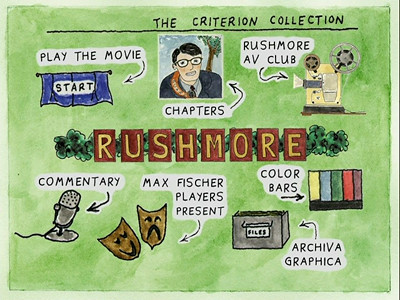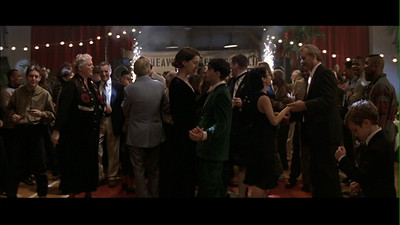
Wes Anderson's Rushmore is a beautiful and delicate movie. This may not be evident on the first or even the second viewing (Francois Truffaut says you have to see a movie three times before you should even attempt to write about it), but it's a quality that you've always sensed is there, the X-factor that you can't quite put your finger on but that tells you there is something special about this one, it's not just another teen movie. The genius of the artistry, and the true reason for Rushmore's popularity, is that it manages to entertain even without the viewer actually getting it completely. It's populist art that really is art. Like a great pop song--a confection Wes Anderson appreciates without peer--the basic attraction the movie elicits works on a very obvious level. It's only with time and wisdom that we realize there is more.
My favorite example of that kind of pop song, of course, is the Shirelles' "Will You Still Love Me Tomorrow?" (I've used it so often, it's like my comfortable pair of pants.) Listen to it once, and it's a love song about feeling nervous because all your dreams are coming true. Listen to it a few times, let the words (written by Carole King) sink in, and you'll realize that it's actually about a girl ready to surrender her virginity, and she's crossing her fingers that the boy she thinks she loves and whom she hopes loves her won't be gone when the sun rises. Wes Anderson could have easily found a spot for this song on his soundtrack

Anderson didn't necessarily need the Shirelles, as his soundtrack has enough fractured pop songs all on its own. As a director, there are very few that can rival his ear for a music cue (Tarantino and Scorsese, perhaps?). Unit 4 Plus 2's "Concrete and Clay" is just as fragile as "Will You Still Love Me Tomorrow?" and its central metaphor is of things that are meant to be solid and eternal shattering into a million pieces. Sure, one ear can hear "Concrete and Clay" and hear a jaunty pop 45 about a love so strong it disintegrates mountains (nature's monument to strength and time) and the cement streets (a man-made foundation, a way to make the world smaller by creating connections) of our cities, things that can stand up to anything that comes their way; listen again with a more cynical ear, though, and ask yourself, if I can't trust the mountains and the roads to last forever, how can I be sure my love won't suffer the same fate? I can dream big, but I don't know that someone else can't dream bigger.
Max Fischer's origin is in very traditional boy's literature. He is Encyclopedia Brown, or for a more cinematic reference, the "Our Gang" mentality of "Hey, kids, let's put on a show." Or, to be more contemporary, Ferris Bueller

Much is made of Wes Anderson's daddy issues. (As Hemingway said, we tell one story over and over, and in each one, we are searching for our father). In his films after Rushmore, the fathers--Royal Tenenbaum, Steve Zissou, the deceased and unseen J.L. Whitman in The Darjeeling Limited

I would actually like to pose that the Bill Murray character, Herman Blume, is not so much a surrogate father figure as a doppelganger to Max. Sure, he may be the type of man Max has always dreamed Bert Fischer could be (and by extension, himself), but again, that dream hits reality, and Blume is more like future Max traveling through time to meet his younger self. Just as much as Max sees Blume as the guy he could one day become, Blume looks at Max as the kid he maybe once was and wishes he could be again. If you think about it, Max inspires a lot of adults to treat him as one of their own--such as Mrs. Calloway (Connie Nielsen), his schoolmate's mother--and also to act like children themselves. His face-offs with Rushmore's principal, Dr. Guggenheim (Brian Cox), brings the good doctor down to Max's level rather than Max rising up to his. Thus, Guggenheim mimicking Max like a playground taunt.
So, too, does Blume act like a child as a result of Max. When he performs as the boy's messenger and talks to their mutual crush, the teacher Miss Cross (Olivia Williams), he doesn't walk away, he runs, like he can't escape fast enough before she sees what is really going on. This also leads to the infamous prank war between the two, with Max unleashing bees in Blume's hotel room and Blume running over the kid's bike with his car (adult tools vs. those of a boy). Miss Cross even says that she dumped Herman because he was a child, and that he and Max are the same.

It's Blume who equates the school Rushmore with Miss Cross, saying "She was my Rushmore." This is the old man lamenting lost love, lamenting lost youth, when a woman could represent everything he desired. When he attended Rushmore, Max was better than the class he was born into, better than society told him he could be. When he had the love of Miss Cross, Blume also feels he's more of a man that what he became. He's not the husband of a wife who strays, the father of boys he doesn't know. Is there any better example of middle-aged angst than Herman Blume, in his pathetic Budweiser swim trunks, leaving his scotch and his cigarette behind on the diving board, jumping into the pool and sinking to the bottom? Even there, he can't escape the nagging world, as the curious and intrusive unnamed child swims by, spying on his pain. Here, too, a perfect music cue: "Nothing In This World Can Stop Me Worryin' Bout That Girl" by the Kinks. Another elegy to perceived perfection and harsh actuality.
I doubt it's a stretch that Wes Anderson sees himself more as Herman Blume than Max Fischer. Max is the kid he probably wanted to be, dreaming of making movies, and if he's like the rest of us, unlike Max, never staging those productions--though Max is a creature of the legitimate theatre. Making Rushmore is that wish fulfillment for Anderson. He gets to put on the shows via Max, hence the recreations of seminal '70s American cinema like Serpico

All coming-of-age tales are, in some way, stories of shedding youthful myths for adult truth. For Max to grow as a person, he needs to accept certain things about himself: that his father is a barber and perfectly okay (and what an amazing acting moment from Murray when he realizes this truth; he says nothing, it's all on his face), he can never have a true love affair with a woman twice his age, and he can never go back to Rushmore. His shift is shown in several ways. For one, he stops taking from Blume and actually helps him. He also stops basing his plays on other people's ideas and writes a story that is all his own, even if the experiences he portrays aren't. (Hey, that's fiction.) The most subtle, though, is also the most telling. After his production of his Vietnam play, in which an overzealous actor cut Max's forehead, Miss Cross notes the wound. He plays it off as being not so much, which is in itself a sign of maturity, but stop and look at where that wound is. It's in the same spot on his forehead that he created the fake injury the last time he tried to seduce her, when Max pretended to be hit by a car. The boy who has pretended to feel deeply no longer has to pretend. The pain is real, and he can deal with it.

One of the best music cues in Rushmore, and one often forgotten due to the song's absence on the soundtrack, is the quiet Rolling Stones number "I Am Waiting,"
"See it come along and
don't know where it's from
Oh, yes, you will find out
Well, it happens all the time
It's censored from our minds
You'll find out
...
Stand up coming years
and escalation fears
Oh, yes, we will find out
Well, like a winter storm
Fears will pierce your bones
You'll find out
Oh we're waiting, oh we're waiting
Oh yeah, oh yeah
Waiting for someone to come out of somewhere."


2 comments:
I enjoyed your blog.
I love everything about this post
Post a Comment